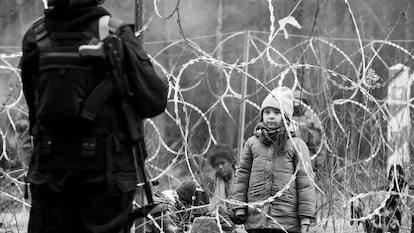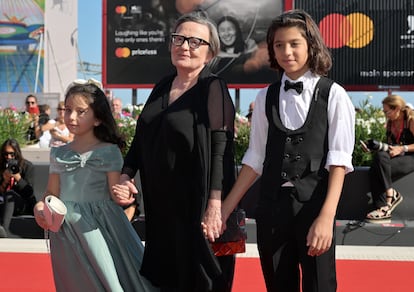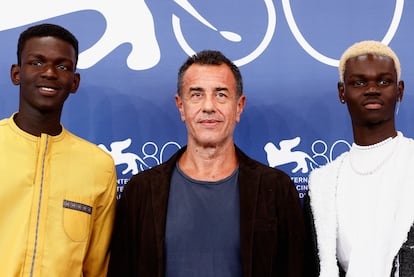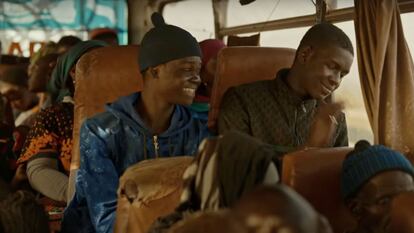Barbed wire, desert and death: The Venice Film Festival travels with migrants and denounces Europe
Agnieszka Holland’s powerful ‘Green Border’ and Matteo Garrone’s uneven ‘Io Capitano’ shine a spotlight on those who leave Syria or Senegal bound for a continent that is now turning its back on them, while Ava DuVernay’s ‘Origin’ is outrageous in its condescension

Agnieszka Holland asked for just one minute of everyone’s time. With that, the never-ending conversation at the Venice Film Festival stopped. There was no cinema, no divas, no glamour. Suddenly, silence reigned for 60 seconds, and then everyone went back to their own business. But it was no longer the same. The veteran Polish director had forced everyone to look, to think, with her gesture at a press conference on Tuesday and, especially, with her film Green Border, a powerful portrait of the ignominy at the border between Belarus and Poland. There, one government intentionally lets migrants cross, while the other sends them back. And so it goes, back and forth, like a twisted game of human pinochle. There is a nuance to the situation: on one side of the border, there is a dictator; on the other, there is the theoretically beloved, peaceful and welcoming European Union.
That’s where Seydou, the main character in Matteo Garrone’s Io Capitano, wants to go. He journeys from Senegal to Sicily in pursuit of a better life. Between the two films, the Mostra competition looked beyond its bubble for a while. And it challenged Brussels, Rome and Warsaw, where xenophobic governments rule and boast of their anti-immigration policies. But the magic of cinema was not forgotten, for it’s what helps Holland’s film shine, making it destined to leave its mark; it isn’t quite as present in the journey featured in the Italian film; and it’s what sinks the day’s third feature. In terms of subject matter, Ava DuVernay’s Origin could well be added to the day’s reflection on racism, caste and discrimination. In terms of film quality, however, it is light years away. What’s more, its preachiness — even in favor of such a just cause — is unbearable.
The comparison was painful, because Green Border shows the eternal validity of a formula that is rarely in fashion today: a difficult subject deserves an equally complex approach. No matter how infuriating the issue, the best way to do it justice is grappling with the topic’s many nuances, which there always are. The mistreated Syrians and Afghans, the border guards, the activists, the citizens. Holland does not avoid looking at death and barbed wire; she is clear about the fact that there are executioners and victims. But she also attempts to observe everything going on, even at the cost of losing some depth in some characters. The only ones missing are politicians, which says it all.

Io Capitano takes on the stimulating perspective of a boy in pursuit of a dream. It’s the viewpoint of Kouassi Pli, the flesh-and-blood inspiration for the script, who sat next to Garrone at the press conference. “It’s been 15 years since my cousin and I left to reach Europe, no matter what it took. We know it’s a deadly journey,” he said. Today, he is 40. And he knows enough Italian to use the very Neapolitan term “cazzimma” (a mixture of courage, determination and mischievous cunning). Thanks to that, Holland made it to his new home. But he was a young man with another home, and a family that he, like thousands of others, left behind on his way to the unknown. In Europe today, many call such people a danger. In Poland, people see “[Belarusian dictator] Lukashenko’s weapons” in them, where there are only people left in limbo.
“The migrant crisis will shape Europe’s future. Its leaders are not stupid, they know it will continue to grow, and the methods that they are using to address the emergency are ineffective. They know that building walls, paying African or Asian tyrants to keep refugees in their territories will not solve the problem. The challenge is deciding what to do. If we continue as we are now, the EU will become like a fortress where we will kill people who try to enter,” Holland told the press. The director was praised by Europe’s denunciations, and Europe returned the attack. Even against her own listeners, she decried the inaction, the media’s “polarization” and the fact that our societies — so reluctant to change and leave their comfort zones — offer fertile ground for populist discourse. Meanwhile, time goes by, the sand in the hourglass keeps dwindling and the drama continues.
The message “October, 2021″ at the beginning of Green Border makes it clear that the story it is telling could have happened yesterday. Or even today: a message at the end of the film reiterates that there are still hidden refugees, or even dead bodies, on that border, even as the viewer is reading those lines. It’s not so far from Ukraine, which Russia invaded. Here is another point of contact among these three films at the festival: what they show on film is also projected every day in our reality. “Some will lose their lives here, not because Europe cannot help them, but because it has chosen not to,” concluded the statement Holland read out. In the meantime, Brussels could well finance a screening of the film in every school on the continent. That would at least be doing something.

Garrone also decided to act. Europe sometimes receives migrants, sometimes rejects them, but it always awaits, as a point of arrival. The filmmaker grabbed his camera and equipment and went to film the point of departure. “For decades we have been seeing boats arriving in the Mediterranean; sometimes they are saved, sometimes not. Over time, we think of them as numbers and lose sight of the fact that there is a whole world and so many desires behind them. The idea is to put the camera on the opposite side, to offer the counter-perspective,” he said. The film works, but only halfway: the main character seems as credible as his journey. The film’s focus never loses sight of Seydou and his perspective: road movie, tragedy, magical realism. The odyssey is very similar to that of Ulysses.
However, the movie hardly surprises or thrills; it’s well-filmed and commendable but ultimately predictable. Traveling across so many countries, the boy crosses deserts and encounters monsters, as well as salvific souls. The director believes that the feature film has elements of his Gomorrah or Pinocchio. He feels that only one adjective defines the adventure that so many migrants dare to face: “Epic.” Garrone adds that “there is a deep injustice on a higher ethical plane in the fact that many of these kids have no answer as to why their contemporaries go to their countries on vacation, but to make the reverse journey, they must face dangers, barges and often death,” he added.

The filmmaker chose to limit himself to suggesting questions. Holland insisted that she does not have the answer. It is up to the viewer, then, to extend the discussion. Origin, however, opts to give it to the audience already resolved. And it seeks to prompt outrage to such an extent that it ends up doing so for the wrong reason: namely, its condescension toward the audience. It is true that the film discusses complex issues: it follows journalist Isabel Wilkerson, the first African American journalist to win a Pulitzer Prize, as she develops the theory that leads to her bestselling book Caste: The Origins of Our Discontents. Wilkerson argues that the beginning of discrimination against blacks can be found in caste rather than racism, Nazi Germany and the Dalits (the lowest caste in Indian society).
All of this is, a priori, fascinating, but it comes from the book. The film concentrates its efforts on pre-chewing its message, lest someone choke on it. “I don’t write questions, I write answers,” says the protagonist. The film devotes its last half hour to a statement on all these evils and how to overcome them. Once again, Hollywood teaches us how to save the world. Presumably, it expects applause and thanks in return. Perhaps the only good news is that now, at least, the main players are no longer the same old powerful white men. We will have to be satisfied with that.
Sign up for our weekly newsletter to get more English-language news coverage from EL PAÍS USA Edition
Tu suscripción se está usando en otro dispositivo
¿Quieres añadir otro usuario a tu suscripción?
Si continúas leyendo en este dispositivo, no se podrá leer en el otro.
FlechaTu suscripción se está usando en otro dispositivo y solo puedes acceder a EL PAÍS desde un dispositivo a la vez.
Si quieres compartir tu cuenta, cambia tu suscripción a la modalidad Premium, así podrás añadir otro usuario. Cada uno accederá con su propia cuenta de email, lo que os permitirá personalizar vuestra experiencia en EL PAÍS.
¿Tienes una suscripción de empresa? Accede aquí para contratar más cuentas.
En el caso de no saber quién está usando tu cuenta, te recomendamos cambiar tu contraseña aquí.
Si decides continuar compartiendo tu cuenta, este mensaje se mostrará en tu dispositivo y en el de la otra persona que está usando tu cuenta de forma indefinida, afectando a tu experiencia de lectura. Puedes consultar aquí los términos y condiciones de la suscripción digital.









































